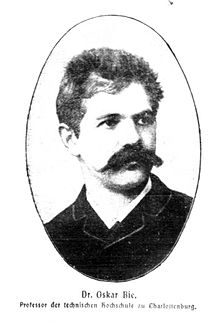Oscar Bie
Oscar Bie , also Oskar, (born February 9, 1864 in Breslau ; died April 21, 1938 in Berlin ) was a German music and art historian and publicist .
Life
Bie studied philosophy , art and music history at the Universities of Breslau , Leipzig and Berlin . In 1886 he received his doctorate and habilitated in 1890 at the Technical University of Berlin for Art History.
1894–1922 he headed the Neue Deutsche Rundschau (formerly Freie Bühne , later Neue Rundschau ). Under his editorship it developed into one of the leading monthly cultural magazines in Germany. As an opera, music and art critic, he worked for the Berliner Börsen-Courier and the Weltbühne .
In 1901 Bie was appointed professor and since 1921 has taught aesthetics at the Berlin University of Music . As a Jewish author, he was banned from publishing after 1933, and his books were no longer allowed to be reprinted.
Publications (selection)
- Between the arts. Contributions to modern aesthetics (1895)
- The Muses in Ancient Art (1887)
- The piano and its masters (1898)
- Intimate Music (1904)
- Dance Music (1905)
- Dance as a work of art (1905)
- The modern art of drawing Berlin 1905 Digitized edition
- Modern Music and Richard Strauss (1906)
- Journey to Art (1910)
- The Opera (1913)
- The Dance (1919)
- The riddle of music (1922)
- Franz Schubert (1925)
- The German Song (1926)
- Richard Wagner and Bayreuth (1931)
literature
- Bie, Oscar. In: Lexicon of German-Jewish Authors . Volume 2: Bend Bins. Edited by the Bibliographia Judaica archive. Saur, Munich 1993, ISBN 3-598-22682-9 , pp. 401-410.
- Walther Vetter : Bie, Oskar. In: New German Biography (NDB). Volume 2, Duncker & Humblot, Berlin 1955, ISBN 3-428-00183-4 , p. 219 f. ( Digitized version ).
- Oskar Bie. In: Richard Drews, Alfred Kantorowicz (ed.): Forbidden and burned. German literature - suppressed for 12 years . Heinz Ullstein - Helmut Kindler Verlag, Berlin and Munich 1947, pp. 21-22.
- Reichs Handbuch der Deutschen Gesellschaft - The handbook of personalities in words and pictures . First volume, Deutscher Wirtschaftsverlag, Berlin 1930, ISBN 3-598-30664-4 .
Web links
- Literature by and about Oscar Bie in the catalog of the German National Library
| personal data | |
|---|---|
| SURNAME | Bie, Oscar |
| BRIEF DESCRIPTION | German music historian, art historian and publicist |
| DATE OF BIRTH | February 9, 1864 |
| PLACE OF BIRTH | Wroclaw |
| DATE OF DEATH | April 21, 1938 |
| Place of death | Berlin |
